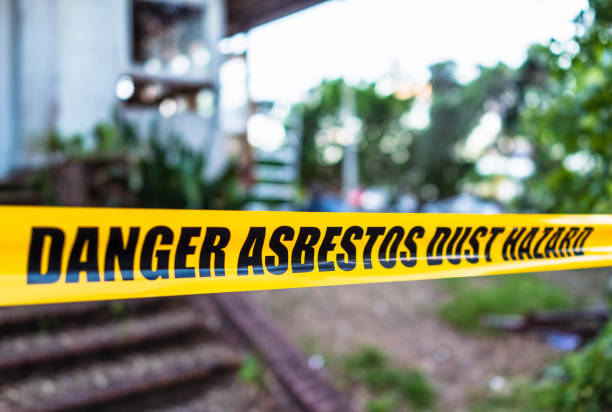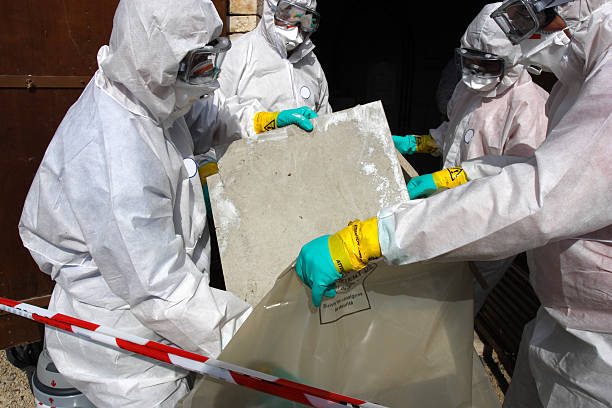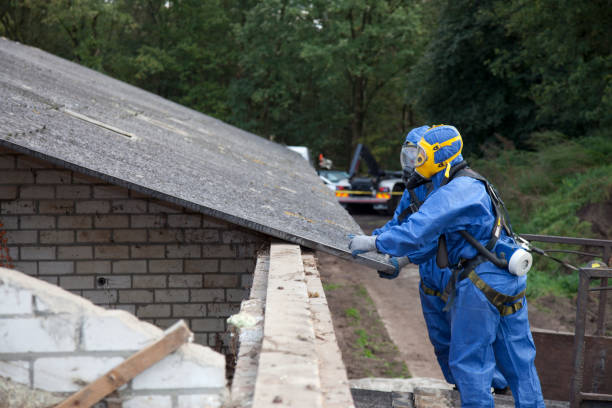As we mark Global Asbestos Awareness Week, businesses and tradespeople are being urged to refocus on the dangers posed by the deadly fibres.
 Major health and safety bodies are urging tradespeople and employers to reflect on how they manage the risks posed by asbestos during their work.
Major health and safety bodies are urging tradespeople and employers to reflect on how they manage the risks posed by asbestos during their work.
Global Asbestos Awareness Week
 Global Asbestos Awareness Week takes place during the first week of April each year to raise awareness of the fact that the potentially lethal substance remains in millions of homes and buildings today.
Global Asbestos Awareness Week takes place during the first week of April each year to raise awareness of the fact that the potentially lethal substance remains in millions of homes and buildings today.
Organized by the Asbestos Disease Awareness Organisation, it aims to improve prevention through the sharing of stories and information.
This year, the awareness week is organized around the theme of ‘One Word, One Week, One World’ and is focusing on four key areas:
- Banning the mining, manufacturing and use of all six asbestos fibres across the world
- Preventing exposure by conducting an asbestos air testing
- Increasing compliance and enforcement of existing laws and regulations
- Strengthening international partnerships to protect public health
The awareness week is supported by many groups and organizations across the world, including the Institution of Occupational Safety and Health (IOSH) and the Health and Safety Executive in Britain.
HSE asbestos campaign targets tradespeople

The HSE recently launched their own campaign, Asbestos & You, to ensure that tradespeople are better informed about the dangers they face when carrying out repair or refurbishment work.
The campaign highlights the fact that, despite being banned from use in the UK in 1999, asbestos-related diseases still kill around 5,000 people each year.
The online construction community ‘On The Tools’ have lent their support to the HSE’s campaign by producing the video ‘Silent Killer: The Tragic Story of Asbestos Victims’ to help raise awareness of the heightened risk experienced by tradespeople.
Britain’s health and safety watchdog has a dedicated campaign website to provide more information about protecting yourself from exposure to the deadly fibres. It includes quick guides and other valuable resources.
IOSH hosts asbestos awareness seminar

Meanwhile, IOSH has also been highlighting the fact that, when not managed correctly, the substance can pose a severe health threat.
The world’s largest occupational health and safety body agrees with the HSE that younger tradespeople are among those most at risk, as they may be less aware of the risks posed by contact with the deadly fibres.
They are hosting a webinar later this month, fronted by Louise Hosking, their Immediate Past President, to call on experts on asbestos management to review what businesses should be doing to properly protect people.
Speaking ahead of the webinar, Louise said that, despite now being banned in many countries across the world, asbestos “still poses a severe threat to people’s lives and livelihoods.”
She added:
“Thousands of people around the world continue to suffer due to past and more recent exposure to asbestos containing materials (ACMs). A lack of awareness on the part of those in control of property, or maintenance and repair, means people will continue to be at risk of potential exposure, placing their health at risk in the years to come.
“But it doesn’t have to be that way. ACMs are only a danger if they are damaged in a manner which releases fibres. Where it is being well managed, the risk reduces. That’s why we need to continue to raise awareness about what it is, where it can be found, and how to prevent exposure to it with trades and property owners.
“Global Asbestos Awareness Week is an opportunity for businesses and people responsible for managing occupational safety and health risks to ask themselves if they’re doing all they can on asbestos management.”
IOSH focused on asbestos as part of its long running No Time to Lose campaign, which raised awareness of occupational cancer.
Inhaling asbestos fibres can cause cancers such as mesothelioma and lung cancer, but it can take as long as 20-30 years after exposure for symptoms of disease to appear. Because of this, asbestos exposure remains the single greatest cause of work-related deaths in Great Britain.
Vital health and safety learning and development
 First Response Training (FRT) is a leading, national training provider. They deliver over 7,000 courses each year in the fields of health and safety, first aid, fire safety, food safety, mental health, health and social care and other special focus topics.
First Response Training (FRT) is a leading, national training provider. They deliver over 7,000 courses each year in the fields of health and safety, first aid, fire safety, food safety, mental health, health and social care and other special focus topics.
Their diverse portfolio includes training awards in Asbestos Awareness, Handling Hazardous Substances (COSHH) and Managing and Supervising Risk.
A trainer from FRT explains:
“Exposure to asbestos fibres can be extremely hazardous, with long lasting and devastating consequences.
“It’s vitally important that all tradespeople and businesses understand the dangers and are aware of the appropriate safety measures they must take to minimise the risks of exposure and protect themselves and their employees from harm.”
For more information on the training that FRT can provide, please call them today on freephone 0800 310 2300 or send an e-mail to info@firstresponsetraining.com.
